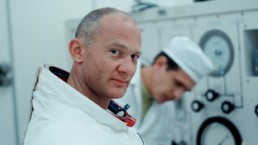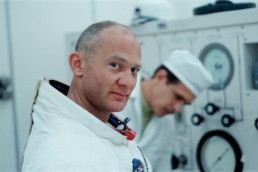‘Apollo 11’ Review: The Moon Landing in Re-Mastered Magnificence
This is a custom heading element.
The thing about history is that, if you weren’t there to experience it, the power of its story lies in the level of the technology of the times that was able to capture it for future generations to lay witness. As present and future students of history, we will learn some of the most transformative and world-changing moments in human experience through what may be seen as the antiquated technologies of old photographs and bits of film. While these images and sequences may be iconic in their simplicity and singularness, it still leaves the viewer to wonder what else went into that moment. Fortunately, we now live in a time where there is a dedication to historical restoration and education that can amplify and nearly re-create the times – which is what the new documentary Apollo 11 does.
The feat of re-presenting history in a way like never before is what we see in Todd Douglas Miller’s documentary Apollo 11. History is re-created through not only the restoration of archival footage – most of which has never been seen before – but also re-mastered for the big screen (unfortunately, by the time this review has come out, Apollo 11 will have ended its IMAX run). The footage, which originally captured this world-changing event in July 1969 and was intended for some yet-to-be-planned project, has been magnificently re-mastered for the big screen in a way that is entirely mind-blowing.
Beyond seeing this archival footage – starting from the days spent prepping the launch at Cape Canaveral and leading up to the history-making shuttle launch attended by thousands of people surrounding the site – is Apollo 11‘s captivating editing. The reason why the film is so gripping is that it’s edited to feel as suspenseful as a Hollywood movie, something more than just a documentary composed solely of historical footage. Seeing inside NASA’s command centers and the antiquated technologies and huge computers that communicated with the astronauts in space – Neil Armstrong, Buzz Aldrin, and Michael Collins – feels more like a time machine than a space shuttle. Seeing each of the different – and many – coordinated shuttle launches and dockings to land on the moon, and then finally home, all come together in a magnificent way. It’s no wonder why Apollo 11 won the editing prize at Sundance this year.
Apollo 11 is an insurmountably captivating viewing experience. While history can feel so abstract and unreal, it goes to show the unbelievable risk and achievement that was landing on the moon. We all have an idea of the moon landing in our minds – to a millennial like me, it is the photo of Neil Armstrong standing next to the American flag on the deserted moon. Hopefully for others, watching Apollo 11 will inspire more to look up in the sky and take awe, which is what all movies can hope to set out to do.
Apollo 11 is rated G. 93 minutes. Now playing at ArcLight Theaters.
Ryan Rojas
Ryan is the editorial manager of Cinemacy, which he co-runs with his older sister, Morgan. Ryan is a member of the Hollywood Critics Association. Ryan's favorite films include 2001: A Space Odyssey, The Social Network, and The Master.


